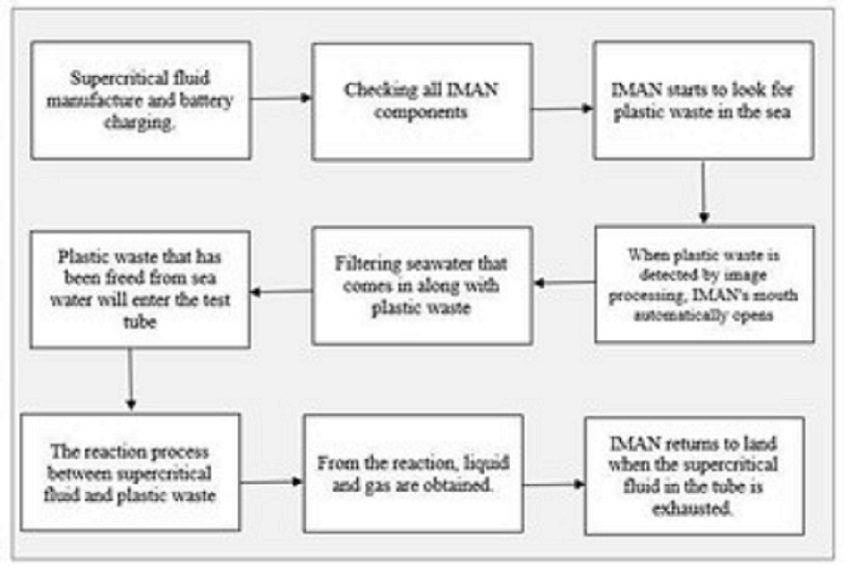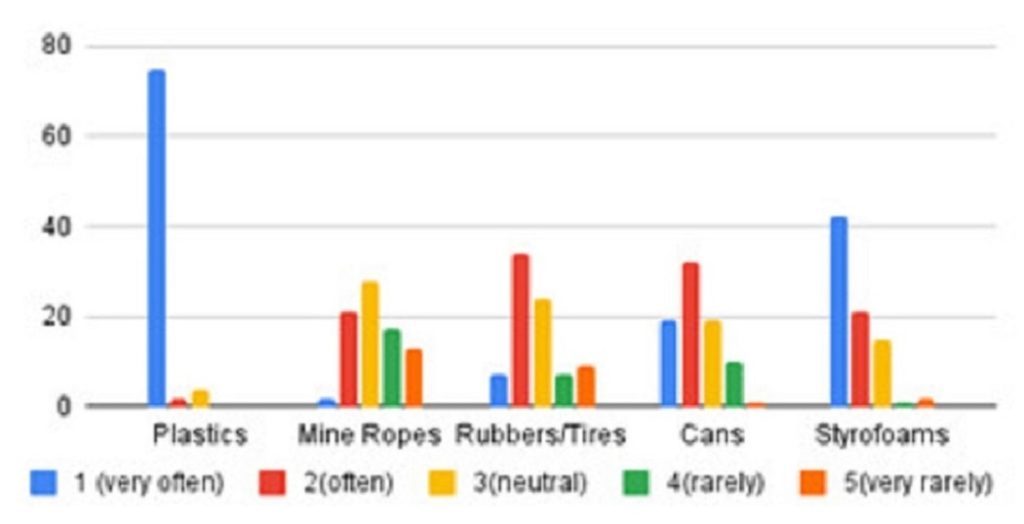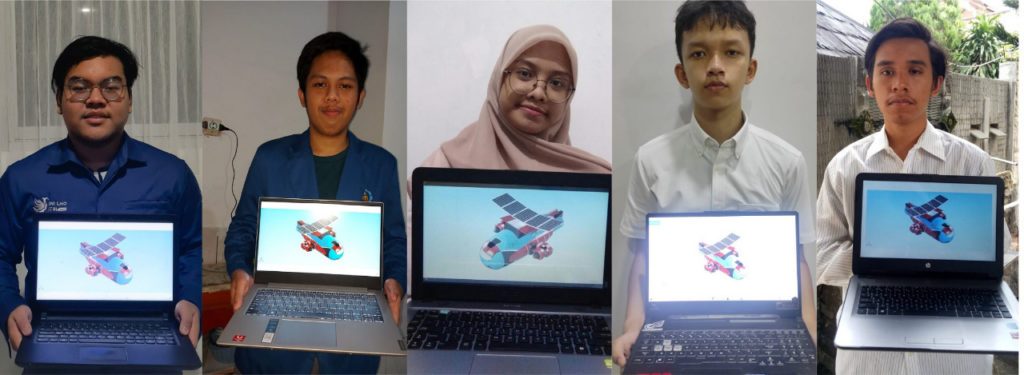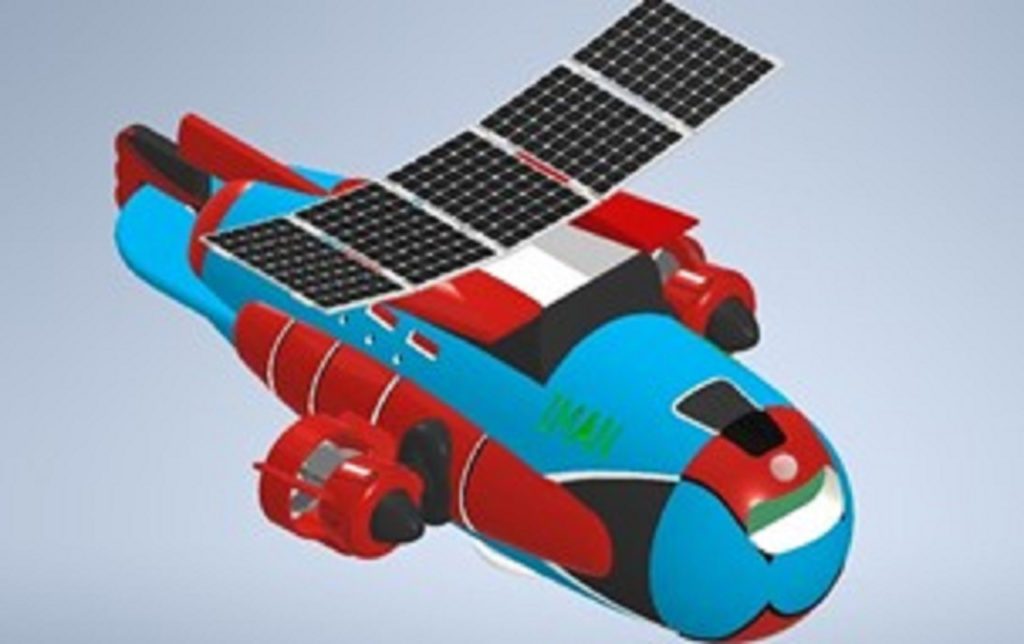ITS Students Innovate IMAN, Ocean Garbage Destroying Robot

A chart explaining the working principle of IMAN, the design of the ITS student team
ITS Campus, ITS News – Plastic waste in Indonesian waters is a severe problem, and breakthroughs are needed to overcome this problem. Seeing this, the student team of Institut Teknologi Sepuluh Nopember (ITS) proposed an automatic robot innovation that combines superfluid technology, and the internet of things (IoT) entitled Integrated Machinery Plastic Waste Cleanser (IMAN) as a new method of fighting plastic waste in the ocean.
The Ministry of Environment and Forestry (KLHK) noted that throughout 2020 there were around half a million tons of plastic waste in the Indonesian seas, making Indonesia the second largest contributor of plastic waste to the sea in the world after China. “IMAN is expected to be able to answer these problems,” said Farhan Fadlurrahman Sutrisno, team leader.

A graph showing the most common types of waste found in Indonesia’s oceans
Farhan added that IMAN is a robot to find and destroy plastic waste in the ocean designed to be integrated by IoT. “IMAN can facilitate the decomposition of plastic waste without having to be collected and moved to another place,” explained the student from the Mechanical Engineering Department.
Furthermore, Farhan explained that IMAN is equipped with camera processing which helps find and identify types of waste when operating in the ocean. When a foreign object is detected as plastic waste, the robot’s mouth will open automatically, and the robot conveyor will bring in the trash for further processing. “On the conveyor, there is a filter so that water does not enter into the robot,” explained Farhan.

(from left) Farhan Fadlurrahman Sutrisno, Muhammad Zainal Afandi Loleh, Zara Ismi Nuraini, Epindonta Ginting, and Yohanes Maruli Arga Septianus showing the results of the IMAN prototype
The waste will then be put into a unique tube and decomposed using hydrogen oxide (H2O) supercritical fluid. The decomposition process is carried out at a temperature of 373 degrees Celsius and a pressure of 22 Mega Pascal, so that plastic waste will decompose immediately when flowing with H2O supercritical fluid. “Some plastic waste will leave a residue, but it can be reused as recycled plastic,” said the 2020 student.
The robot, designed with dimensions of 6.5 x 2.5 x 3.8 meters, also utilizes solar panels as an electric power supply. Farhan explained that IMAN itself could last up to eight hours of operation depending on the intensity of plastic waste processing carried out. “It takes three to six minutes to process one kilogram of waste with an effectiveness reaching 95.6 percent,” added the young man who was born in Depok in 2002.

Display of the IMAN prototype, a robot that destroys plastic waste in the ocean which was innovated by the ITS student team
With the guidance of ITS Mechanical Engineering Department lecturer Prof. Dr. Eng Ir Prabowo MEng, Farhan made this innovation with his four colleagues, namely Zara Ismi Nuraini (Mechanical Engineering Department), Epindonta Ginting (Mechanical Engineering Department), Yohanes Maruli Arga Septianus (Material Engineering Department), and Muhammad Zainal Afandi Loleh (Department of Chemical Engineering). Thanks to this innovation, this team has successfully won a gold medal in the Waste Treatment category in the Indonesia International Applied Science Project Olympiad (I2ASPO) competition organized by the Indonesian Young Scientist Association (IYSA) ago.
Finally, Farhan hopes that his team’s innovation can be realized to solve the problem of waste in Indonesian oceans. “We hope that IMAN will not only be a solution for this nation but also be able to answer the problem of plastic waste at the world level,” he said. (ITS Public Relation/far)
Reporter: Frecia Elrivia Mardianto
Related News
-
ITS Collaboration with BPBD East Java, Launching VR Disaster Simulation
ITS Campus, ITS News — Supporting anticipation of disasters and continuing to educate the public, Institut Teknologi Sepuluh Nopember
December 31, 2021 21:12 -
Supporting the Implementation of Innovative Ideas, ITS and IYSA Hold International Competition
ITS Campus, ITS News — Institut Teknologi Sepuluh Nopember (ITS) has once again proven its commitment to supporting the
December 31, 2021 21:12 -
ITS Maintains Informative Qualification for Five Consecutive Years at KIP Awards
ITS Campus, ITS News — Institut Teknologi Sepuluh Nopember (ITS) has once again successfully maintained its Informative Qualification predicate
December 31, 2021 21:12 -
ITS Strengthens Smart Eco-Campus through UI GreenMetric 2024
ITS Campus, ITS News — Institut Teknologi Sepuluh Nopember (ITS) has once again demonstrated its commitment to environmental concern
December 31, 2021 21:12
